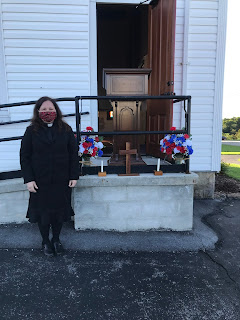The Gospel we are focusing on today is from Matthew; this entire year focuses on the gospel of Matthew. That is important. It is important that we look at the unique perspectives of each Gospel writer.
I know as a child I would proudly shout to my Sunday School teachers that the New testament was Matthew, Mark, Luke and John, without pausing between those words. To be fair, I also thought that part of the alphabet called LMNOP was a word, and not a series of letters.
It is important to slow down and really hear what is being said.
Today’s reading, like much of Matthew, is focused on law and judgment. Matthew is polarizing, so perhaps it is the best text to guide us today, as we are living in polarizing times.
I am currently taking online Seminary classes and during most of next week I will be in a series of Zoom sessions. Fortunately, I have already had my class on worship, so I know that today’s lessons are from lectionary 23, Year A in a three-year liturgical cycle. If we were in year B, our Gospel lesson we would be about Jesus casting out a demon. If it were year C, the Gospel passage would remind us of the costs of discipleship. But we are here, in a parking lot, on September 6th of 2020, Liturgical year of A, during a pandemic.
I have also attended corporate meetings that were brainstorming sessions. In those meetings, ideas written on post-it notes, that were considered off topic, were put aside on a place on the dry erase board called the “parking lot.” Those ideas were different and would never be addressed within the meeting.
I even have a gravel parking lot behind my house. The other morning as I pulled out of my parking lot, a neighbor flagged me down. She wanted to ask for my help to find a building to worship in. Recently there was turmoil within her Church. My neighbor and her half of the congregation are looking for a space to rent. I called every place I could think of, and due to Covid 19 restrictions, there are very few options. Which brings us back to Matthew. Did you know that this Gospel contains the first reference to the word “Church?” It also includes issues of church authority and discipline. In our passage today we read about harm within a Church. The Gospel of Matthew was written somewhere between 70 to 100 years after the birth of Jesus Christ, and we were already having so much friction within the Church that we needed canonized instructions on how to deal with it.
Our Gospel lesson encourages us to try to resolve it privately. Then we bring witnesses. Then we bring the complaint before the whole church. If none of those approaches resolve the dispute. Matthew gives us the guidance of Jesus: “let such a one be to you as a Gentile and a tax collector.”
Many understand this passage as the instructions on how to throw someone out of a Church.
Instead, I think we should remember the story of the Canaanite woman and her possessed daughter from three Sundays past. Jesus praised the faith of a gentile.
Jesus also welcomed the tax collector. There are a multitude of passages in the bible recounting Jesus sitting and eating with them. My favorite example, I remember from my childhood in Sunday School and it was from the Gospel of Luke.
Zaccheus was a wee, little man,
And a wee, little man was he.
He climbed up in a sycamore tree,
For the Lord he wanted to see.
And as the Savior came that way,
He looked up in the tree,
And he said, "Zaccheus, you come down from there, "
For I'm going to your house today.
For I'm going to your house today.
The part that was not included in the Sunday School Song was what happened after they dined together:
Zacchaeus was glad to welcome Jesus into his home. But the people who saw this began to express disapproval. They said, “He went to be the guest of a sinner.” Later, at dinner, Zacchaeus stood up and said to the Lord, “Lord, I’ll give half of my property to the poor. I’ll pay four times as much as I owe to those I have cheated in any way.”
Today we read Matthew 18:15-20, in a time of great anguish and suffering for so many people. But I have I read it before at another Church also called St. Paul. That Church was in Washington DC. For an entire year we read verse 20 at Sunday School and during service:
“For where two or three are gathered in my name, I am there among them.” There is a great deal of hope, a great deal of Grace in those simple 15 words.
After a year of saying those words, the Church council of St. Paul in DC asked me if I would chair the evangelism committee. I began asking people to come Church and have never stopped asking. Once you know the peace and joy of Christ within your soul, you want everyone to rejoice together. So whether we meet within our beloved Churches or outside the Church in the parking lots, We journey together and Christ is with us, always.
Amen.





